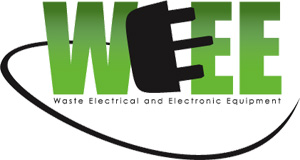WEEE Directive

WEEE Regulations Thermometers Direct Ltd
Is committed to achieving full conformance to environmental legislation including the RoHS (2002/95/EC) the Restriction of the use of certain Hazardous Substances in Electrical and Electronic Equipment) and WEEE (2002/96/EC Waste Electrical and Electronic Equipment) Directives.
Producer Registration Number: WEE/KC0053TQ
All Electronic and Electrical Equipment (EEE) placed onto the market from 13th August 2005, Must be marked with this symbol ( Wheeled Bin crossed out symbol) to indicate that it is covered by the WEEE Directive, the provisions of which require that producers or manufacturers of EEE become liable to pay for take-back treatment and recycling of end of life equipment (WEEE):
As a distributor of EEE, we must take-back household WEEE from UK consumers and has decided to fulfil its obligations in this area by Using the DHL Compliance scheme.
This will ensure that WEEE is disposed of by customers or by us in a way that optimizes its re-use and recycling. The recycling and treatment of WEEE itself is part of the producer's obligation under the WEEE Directive. Once we have WEEE, these then are taken away by DHL for re-use or re-Processing.
You are more then welcome to take Weee to a Local Weee Recycling centre.
An online search facility to help you identify a DCF near you is available on the following website: www.recycle-more.co.uk
If your old piece of electronic equipment is still in a good working condition or could be repaired for further use, please consider donating it to a charitable organisation or by giving it to someone else in need. By extending the lifetime of your old equipment you are also contributing to the efficient use of resources and avoiding additional waste.
Please note that from July 1, 2007, it will be possible for you to dispose of your WEEE and ensure that it is recycled. EEE may contain hazardous substances which, if exposed, may have a serious detrimental effect on the environment and human health. All WEEE that you volunteer for recycling will be specifically collected and treated by designated local waste facility centres and by licensed WEEE compliance schemes. By ensuring that you dispose off your old electrical and electronic equipment according to the new WEEE legislation you are helping to preserve our natural resources and protect human health.
The production of electrical and electronic equipment is one of the fastest growing domains of manufacturing in the western world, and with broad consumer take-up of products in this area, there is also a mounting issue of waste. In June 2000, the European Commission put forward proposals to address this issue, and in December 2002 these were passed as the EU Waste Electronic and Electrical Equipment (WEEE) Directive.
For the UK, the WEEE Regulations were laid before Parliament on December 12, 2006. The main requirements and obligations on producers and distributors of Electronic and Electrical Equipment (EEE) came into effect from July 1, 2007.
The major provisions of the WEEE Directive are:
All manufacturers (or anyone else selling a product on the market in the EU) are liable to pay for take-back, treatment and recycling of end-of-life equipment.
Improve re-use/recycling of WEEE.
Ensure the separate collection of WEEE.
Inform the public about their role in dealing with WEEE.
Which products fall under the legislation and how do I recognise them?
The WEEE Directive divides Electronic and Electrical Equipment into ten categories:
Category 1 - Large household appliances (fridges, cookers, microwaves, washing machines, etc.)
Category 2 - Small household appliances (vacuum cleaners, clocks, toasters, etc.)
Category 3 - IT and Telecommunications equipment (PCs, mainframes, printers, copiers, phones, etc.)
Category 4 - Consumer equipment (radios, hi-fi, musical instruments, videos, camcorders, etc.)
Category 5 - Lighting equipment (fluorescent tubes and holders, sodium lamps, etc.)
Category 6 - Electrical and electronic tools (drills, sewing machines, electric lawnmowers, etc.)
Category 7 - Toys, leisure and sports equipment (electric trains, games consoles, exercise machines, etc.)
Category 8 - Medical devices (analysers, dialysis machines, medical freezers, etc.)
Category 9 - Monitoring and control equipment (smoke detectors, thermostats, scales, etc.)
Category 10 - Automatic dispensers (hot drinks machines, sweet and chocolate bar dispensers, cash machines, etc.)
Glossary:
DCF (Designated Collection Facility): A public amenity site licensed to collect, separate and recycle WEEE for collection by a licensed producer compliance scheme.
DTS (Distributor Take-back Scheme): The WEEE compliance scheme for retailers, approved by the Department for Trade and Industry
EEE (Electronic and Electrical Equipment)
WEEE (Waste Electronic and Electrical Equipment): All end-of-life equipment falling under the WEEE directive (for the specific categories see section 6 above).
If you have brought thermometers from us, we will be happy to receive the thermometers back for Weee disposal.
You don't have to buy like for like to return your Weee we will accept all weee brought from us.
Please provide proof of purchase when returning a thermometer.
Thermometers can be returned too :-
Units 3&4 Hawley Lane Business Park
108 Hawley Lane
Farnborough
Hampshire
GU14 8JE
----------------------------------------------
Approximately 3% of all household batteries are recycled in the UK, which is a very small amount. A majority of old batteries end up in landfill, where they can leak harmful chemicals into the soil.
You should find out how and where you can recycle batteries to reduce their harmful impact on the environment We do not sell over 1 Ton of batteries a year and do not need to provide Recycling Facilities for these.
Please recycle batteries at many Household Waste & Recycling Centres (HWRCs).
http://www.recycle-more.co.uk/banklocator/banklocator.asp